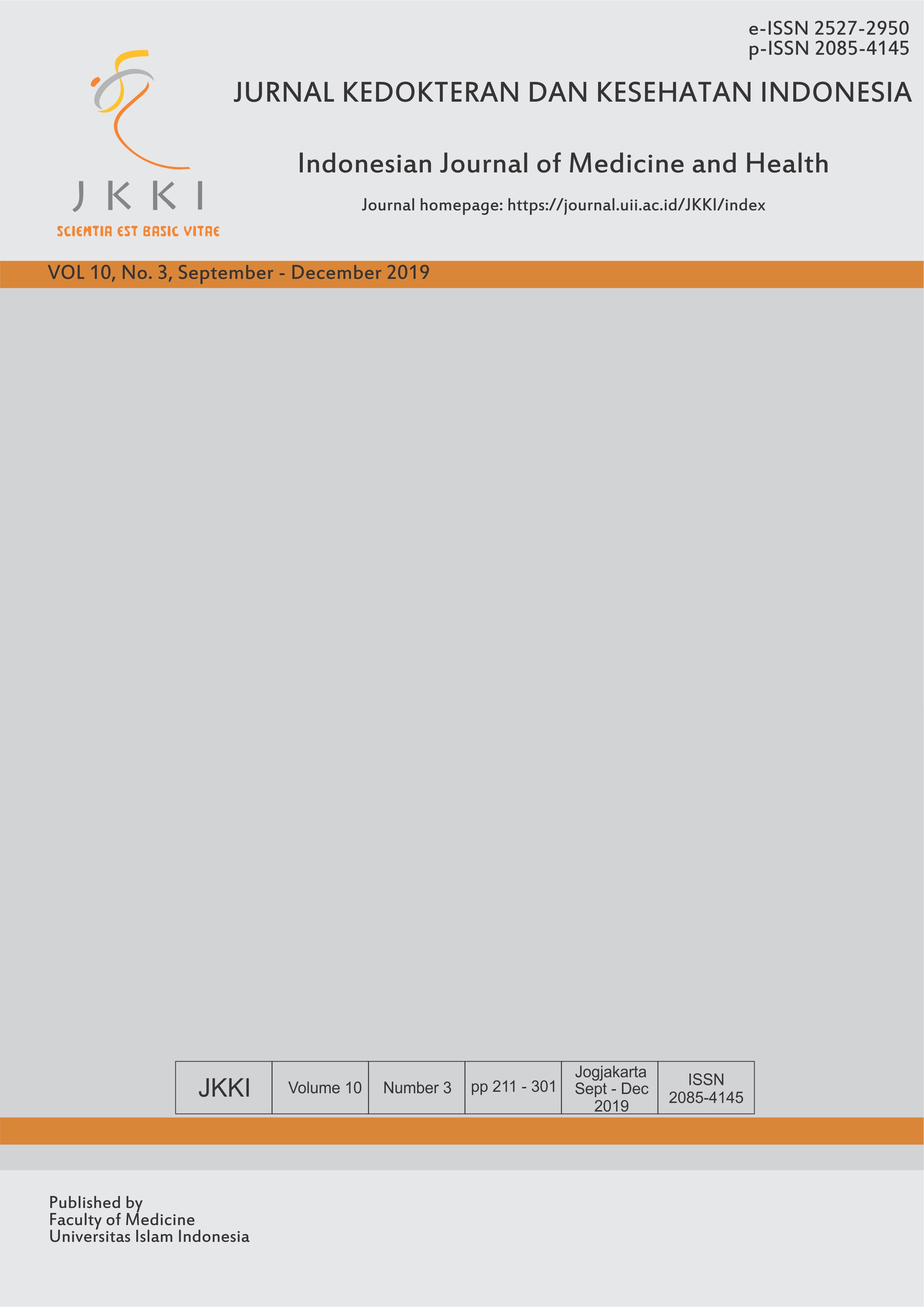Main Article Content
Abstract
Background: The self-efficacy to cope with breast cancer patients can improve their adaptive coping skills, well-being and quality of life.
Objective: This study aims to identify the effects of a support group to improve self-efficacy of breast cancer patients that receiving chemotherapy.
Methods: This study used a quasy-experimental design with non-equivalent control pre-test post-test design. As much as 76 patients with breast cancer were assigned into either an experimental group or a control group (38 person each). All of them were selected through a consecutive sampling method. In addition, it used an instrument of cancer behavior inventory version 2.
Results: Respondents who were supported by the support group had 1.4 times higher level of self-efficacy to cope with cancer than those who were not supported by a support group. No significant difference in the level of self-efficacy to cope with the cancer between the experimental group and the control group (RR 1.4 with 95% CI 1.0-1.8, a > 0.05).
Conclusion: Supports provided by the support group had no effect on the level of self-efficacy to cope with the cancer.
Keywords
Article Details
Authors who publish in the Jurnal Kedokteran dan Kesehatan Indonesia agree to the following terms:
- Authors retain copyright and grant Jurnal Kedokteran dan Kesehatan Indonesia right of first publication with the work simultaneously licensed under a Creative Commons Attribution Licence that allows others to adapt (remix, transform, and build) upon the work non-commercially with an acknowledgement of the work's authorship and initial publication in Jurnal Kedokteran dan Kesehatan Indonesia.
- Authors are permitted to share (copy and redistribute) the journal's published version of the work non-commercially (e.g., post it to an institutional repository or publish it in a book), with an acknowledgement of its initial publication in Jurnal Kedokteran dan Kesehatan Indonesia.
References
- Allison JL, Sherwood RS, Schust DJ. Management of first trimester pregnancy loss can be safely moved into the office. Review Obstetrics and Gynecology. 2011;4(1):5.
- Rahman FF. Pengantar ilmu kesehatan masyarakat: Introduction to public health. Vol. 1. Gosyen publishing; 2019.
- Kemenkes RI. Penderita kanker diperkirakan menjadi penyebab utama beban ekonomi terus meningkat. Indonesia; 2012. Available from: http://www.depkes.go.id/i.
- Ricci SS, Kyle T. Maternity and pediatric nursing. Lippincott Williams & Wilkins; 2009.
- Andrews G. Buku ajar kesehatan reproduksi wanita. Jakarta EGC. 2009
- Björneklett HG, Rosenblad A, Lindemalm C, Ojutkangas M-L, Letocha H, Strang P, et al. Long-term follow-up of a randomized study of support group intervention in women with primary breast cancer. Journal of Psychosomatic Research. 2013;74(4):346–53.
- Helgeson VS, Cohen S, Schulz R, Yasko J. Long-term effects of educational and peer discussion group interventions on adjustment to breast cancer. Health Psychology. 2001;20(5):387.
- Campbell HS, Phaneuf MR, Deane K. Cancer peer support programs—do they work? Patient Education and Counseling. 2004;55(1):3–15.
- Mattioli JL, Repinski R, Chappy SL. The meaning of hope and social support in patients receiving chemotherapy. In: Oncology Nursing Forum. 2008.
- Arora NK, Finney Rutten LJ, Gustafson DH, Moser R, Hawkins RP. Perceived helpfulness and impact of social support provided by family, friends, and health care providers to women newly diagnosed with breast cancer. Psycho-Oncology. 2007;16(5):474–86.
- Merluzzi T V, Martinez Sanchez MA. Assessment of self-efficacy and coping with cancer: development and validation of the cancer behavior inventory. Health Psychology. 1997;16(2):163.
- Lev EL, Daley KM, Conner NE, Reith M, Fernandez C, Owen S V. An intervention to increase quality of life and self-care self-efficacy and decrease symptoms in breast cancer patients. Scholarly Inquiry for Nursing Practice. 2001;15(3):277–94.
- Howsepian BA, Merluzzi T V. Religious beliefs, social support, self-efficacy and adjustment to cancer. Psycho-Oncology Journal. 2009;18(10):1069–79.
- Morris BA, Chambers SK, Campbell M, Dwyer M, Dunn J. Motorcycles and breast cancer: The influence of peer support and challenge on distress and posttraumatic growth. Support Care Cancer. 2012;20(8):1849–58.
References
Allison JL, Sherwood RS, Schust DJ. Management of first trimester pregnancy loss can be safely moved into the office. Review Obstetrics and Gynecology. 2011;4(1):5.
Rahman FF. Pengantar ilmu kesehatan masyarakat: Introduction to public health. Vol. 1. Gosyen publishing; 2019.
Kemenkes RI. Penderita kanker diperkirakan menjadi penyebab utama beban ekonomi terus meningkat. Indonesia; 2012. Available from: http://www.depkes.go.id/i.
Ricci SS, Kyle T. Maternity and pediatric nursing. Lippincott Williams & Wilkins; 2009.
Andrews G. Buku ajar kesehatan reproduksi wanita. Jakarta EGC. 2009
Björneklett HG, Rosenblad A, Lindemalm C, Ojutkangas M-L, Letocha H, Strang P, et al. Long-term follow-up of a randomized study of support group intervention in women with primary breast cancer. Journal of Psychosomatic Research. 2013;74(4):346–53.
Helgeson VS, Cohen S, Schulz R, Yasko J. Long-term effects of educational and peer discussion group interventions on adjustment to breast cancer. Health Psychology. 2001;20(5):387.
Campbell HS, Phaneuf MR, Deane K. Cancer peer support programs—do they work? Patient Education and Counseling. 2004;55(1):3–15.
Mattioli JL, Repinski R, Chappy SL. The meaning of hope and social support in patients receiving chemotherapy. In: Oncology Nursing Forum. 2008.
Arora NK, Finney Rutten LJ, Gustafson DH, Moser R, Hawkins RP. Perceived helpfulness and impact of social support provided by family, friends, and health care providers to women newly diagnosed with breast cancer. Psycho-Oncology. 2007;16(5):474–86.
Merluzzi T V, Martinez Sanchez MA. Assessment of self-efficacy and coping with cancer: development and validation of the cancer behavior inventory. Health Psychology. 1997;16(2):163.
Lev EL, Daley KM, Conner NE, Reith M, Fernandez C, Owen S V. An intervention to increase quality of life and self-care self-efficacy and decrease symptoms in breast cancer patients. Scholarly Inquiry for Nursing Practice. 2001;15(3):277–94.
Howsepian BA, Merluzzi T V. Religious beliefs, social support, self-efficacy and adjustment to cancer. Psycho-Oncology Journal. 2009;18(10):1069–79.
Morris BA, Chambers SK, Campbell M, Dwyer M, Dunn J. Motorcycles and breast cancer: The influence of peer support and challenge on distress and posttraumatic growth. Support Care Cancer. 2012;20(8):1849–58.

